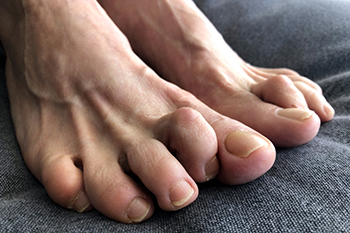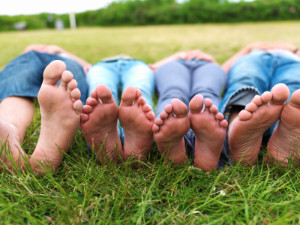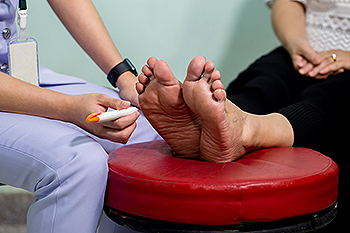Connect With Us
Blog
Items filtered by date: February 2022
What Might Be Causing My Child’s Foot Pain?
There are many reasons your child may be experiencing foot pain. If your child plays a sport, you’ll want to find out if they’ve recently had an accident or injury. Physically active children are more at risk for obtaining an ankle sprain or strain, Achilles tendonitis, fracture, or other injury. Children between 9 and 14 years old can go through growth spurts where the growth plate at the heel becomes stressed and inflamed (Sever’s disease). This condition can be exacerbated by physical activity. Your child may have outgrown their footwear or are wearing shoes without proper support and cushioning. Perhaps your child has never developed arches, which can cause pain throughout the feet, ankles and calves. Does your child trim their own toenails? If so, they may have developed a painful ingrown toenail from cutting their nails too short. Has your child been walking differently? Check the bottom of their feet for plantar warts. These contagious growths can be very painful when walking or running. To get to the bottom of your child’s foot pain, it's a good idea to have a podiatrist perform a thorough examination.
When dealing with systemic disease of the feet, it is extremely important to check the affected areas routinely so that any additional problems are caught quickly. If you have any concerns about your feet and ankles contact Dr. Howard Horowitz from Bowie Foot & Ankle . Our doctor will assist you with all of your podiatric needs.
Systemic Diseases of the Feet
Systemic diseases affect the whole body, and symptoms usually are displayed in the feet. This condition can make a patient’s ability to walk unbearable. Systemic diseases include gout, diabetes mellitus, neurological disorders, and arthritis.
Gout – is caused by an excess of uric acid in the body. Common symptoms include pain, inflammation, and redness at the metatarsal/phalangeal joint of the base big toe. Gout can be treated by NSAIDs to relieve pain and inflammation, and other drugs that lower the acid levels in the body.
Diabetes mellitus – is an increase in the level of blood sugar that the body cannot counteract with its own insulin. Failure to produce enough insulin is a factor in Diabetes.
Diabetes of the Feet
Diabetic Neuropathy – may lead to damaged nerves and affect the feet through numbness and loss of sensation.
Peripheral Vascular Disease – can restrict the blood flow to the feet, and often times lead to amputation of the feet.
If you have any questions please feel free to contact our office located in Bowie, MD . We offer the newest diagnostic and treatment technologies for all your foot and ankle needs.
How to Get Your Baby Started on the Right Foot
Having healthy feet is a lifelong journey, and developing a foot care program for your child can start at birth. One way babies develop muscle strength is by kicking and wiggling their feet and legs. So it’s a good idea to avoid constricting bed covers and footwear. It is thought that going barefoot helps the child’s feet develop properly. If your baby wears socks or one-piece outfits with feet, be sure to check them frequently to make sure they are not too tight around the toes. It’s also important to keep the baby's feet clean and dry daily. Here are a few things to look for as your child gets older: turning the foot in or out, not walking independently by around 18 months, frequent tripping and falling, still walking on toes by age 3, skin rashes, bumps, or other foot problems. It is a good idea to start early with a visit to a podiatrist who can examine your child’s feet and deal with any problems that may arise as he or she grows.
Making sure that your children maintain good foot health is very important as they grow. If you have any questions, contact Dr. Howard Horowitz of Bowie Foot & Ankle . Our doctor can provide the care you need to keep you pain-free and on your feet.
Keeping Children's Feet Healthy
Having healthy feet during childhood can help prevent medical problems later in life, namely in the back and legs. As children grow, their feet require different types of care. Here are some things to consider...
Although babies do not walk yet, it is still very important to take care of their feet.
Avoid putting tight shoes or socks on his or her feet.
Allow the baby to stretch and kick his or her feet to feel comfortable.
As a toddler, kids are now on the move and begin to develop differently. At this age, toddlers are getting a feel for walking, so don’t be alarmed if your toddler is unsteady or ‘walks funny’.
As your child gets older, it is important to teach them how to take care of their feet.
Show them proper hygiene to prevent infections such as fungus.
Be watchful for any pain or injury.
Have all injuries checked by a doctor as soon as possible.
Comfortable, protective shoes should always be worn, especially at play.
If you have any questions please feel free to contact our office located in Bowie, MD . We offer the newest diagnostic and treatment technologies for all your foot and ankle needs.
Living With Hammertoe
 Hammertoe is a common foot deformity in which one or more of the smaller toes bend downward at the middle joint. Over time, the affected joints become stiff and difficult or even impossible to move. The tops of the affected toes can develop corns, blisters, and calluses from rubbing up against your shoes, causing pain and making it difficult to find proper footwear. Hammertoe is progressive, meaning it gets worse over time when it is left untreated. When caught in its earlier stages, hammertoe can be treated with conservative methods. These include wearing comfortable, properly fitted shoes, wearing orthotic inserts, and padding the affected toes to prevent skin irritation. For more information about hammertoe, please consult with a podiatrist.
Hammertoe is a common foot deformity in which one or more of the smaller toes bend downward at the middle joint. Over time, the affected joints become stiff and difficult or even impossible to move. The tops of the affected toes can develop corns, blisters, and calluses from rubbing up against your shoes, causing pain and making it difficult to find proper footwear. Hammertoe is progressive, meaning it gets worse over time when it is left untreated. When caught in its earlier stages, hammertoe can be treated with conservative methods. These include wearing comfortable, properly fitted shoes, wearing orthotic inserts, and padding the affected toes to prevent skin irritation. For more information about hammertoe, please consult with a podiatrist.
Hammertoe
Hammertoes can be a painful condition to live with. For more information, contact Dr. Howard Horowitz from Bowie Foot & Ankle . Our doctor will answer any of your foot- and ankle-related questions.
Hammertoe is a foot deformity that affects the joints of the second, third, fourth, or fifth toes of your feet. It is a painful foot condition in which these toes curl and arch up, which can often lead to pain when wearing footwear.
Symptoms
- Pain in the affected toes
- Development of corns or calluses due to friction
- Inflammation
- Redness
- Contracture of the toes
Causes
Genetics – People who are genetically predisposed to hammertoe are often more susceptible
Arthritis – Because arthritis affects the joints in your toes, further deformities stemming from arthritis can occur
Trauma – Direct trauma to the toes could potentially lead to hammertoe
Ill-fitting shoes – Undue pressure on the front of the toes from ill-fitting shoes can potentially lead to the development of hammertoe
Treatment
Orthotics – Custom made inserts can be used to help relieve pressure placed on the toes and therefore relieve some of the pain associated with it
Medications – Oral medications such as anti-inflammatories or NSAIDs could be used to treat the pain and inflammation hammertoes causes. Injections of corticosteroids are also sometimes used
Surgery – In more severe cases where the hammertoes have become more rigid, foot surgery is a potential option
If you have any questions please contact our office located in Bowie, MD . We offer the newest diagnostic and treatment technologies for all your foot and ankle needs.
It's Time for Beautiful Feet
Treating Peripheral Neuropathy
Peripheral neuropathy occurs when nerves in the extremities become damaged and dysfunctional. Peripheral neuropathy can cause numbness, tingling, burning/shooting pains and muscle weakness in the feet, along with cramps, swelling, sensitivity, and a loss of coordination and balance. This condition often makes it difficult for people to walk. Peripheral neuropathy is often caused by the elevated sugar levels associated with diabetes, but may also occur due to viral infections, injury, or as a side effect of taking certain medications or indulging in too much alcohol. A podiatrist can help treat peripheral neuropathy through pharmaceutical and physical therapy, custom orthotics for your shoes, or even nerve stimulation treatments. It is suggested that you call a podiatrist to explore treatment options for your peripheral neuropathy.
Neuropathy
Neuropathy can be a potentially serious condition, especially if it is left undiagnosed. If you have any concerns that you may be experiencing nerve loss in your feet, consult with Dr. Howard Horowitz from Bowie Foot & Ankle . Our doctor will assess your condition and provide you with quality foot and ankle treatment for neuropathy.
What Is Neuropathy?
Neuropathy is a condition that leads to damage to the nerves in the body. Peripheral neuropathy, or neuropathy that affects your peripheral nervous system, usually occurs in the feet. Neuropathy can be triggered by a number of different causes. Such causes include diabetes, infections, cancers, disorders, and toxic substances.
Symptoms of Neuropathy Include:
- Numbness
- Sensation loss
- Prickling and tingling sensations
- Throbbing, freezing, burning pains
- Muscle weakness
Those with diabetes are at serious risk due to being unable to feel an ulcer on their feet. Diabetics usually also suffer from poor blood circulation. This can lead to the wound not healing, infections occurring, and the limb may have to be amputated.
Treatment
To treat neuropathy in the foot, podiatrists will first diagnose the cause of the neuropathy. Figuring out the underlying cause of the neuropathy will allow the podiatrist to prescribe the best treatment, whether it be caused by diabetes, toxic substance exposure, infection, etc. If the nerve has not died, then it’s possible that sensation may be able to return to the foot.
Pain medication may be issued for pain. Electrical nerve stimulation can be used to stimulate nerves. If the neuropathy is caused from pressure on the nerves, then surgery may be necessary.
If you have any questions, please feel free to contact our office located in Bowie, MD . We offer the newest diagnostic and treatment technologies for all your foot care needs.




